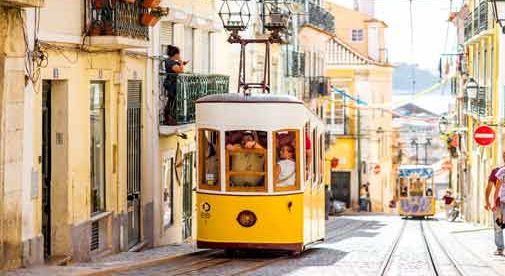So, you’ve fallen in love with Portugal and are ready to take the plunge into expat life. This can be a life-changing and rewarding experience if you prepare adequately and approach it with an open mind.
Here are five key mistakes to avoid when moving to Portugal:
1. Don’t Compare Portugal to the U.S.
While this may sound like a no-brainer, many newbies who move to Portugal experience culture shock when they realize that things are different. To be successful as an expat, you’ll need to adapt. Embrace the culture, accept the differences, and never try to change Portugal to be like the place that you left behind.
Understand that as an expat, you will be doing many of the things that took you a lifetime to accomplish in the U.S. Getting documented as a resident, setting up your home, exchanging your driver’s license, getting health insurance, a bank account, and so much more. Not to mention that all the signs, paperwork, and people will speak a language you probably have never heard.
As soon as you decide to move to Portugal, look for resources to start learning the language. Reach out to seasoned expats on some of the Portugal Facebook groups for suggestions. Whether you select private lessons online, group classes, or an internet-based program, realize that you’ll be studying Portuguese for many years to come. Learning a language cannot be done in a few weeks or months but takes time, effort, and practice. Enjoy the challenge.
2. Don’t Expect the Process of Moving to be Cheap
While Portugal enjoys a (well deserved) reputation as one of the best bargains in Western Europe, relocating, shipping your stuff, and getting settled into a house or apartment will take a significant amount of money. A one-year lease is a required part of the resident visa process. You will likely be paying rent for three or four months before you are actually living in the apartment, but everyone must do this so grin and accept it.
A funded bank account is another requirement. All banks in Portugal charge monthly fees to have an account with them. Portugal does have a tax treaty with the U.S. and Canada, so your worldwide income will not be double taxed, but paying taxes is another fact of living abroad. Do consult with a tax specialist about this matter.
What if you make the move to Portugal and realize it’s not for you? Yes, it happens.
Some people cannot adjust to living in a foreign country and do return home. Do you have money set aside if this happens?
3. Don’t Assume That You Can Just Come and Go Anytime
Everyone who decides to live in Portugal must apply for a long-stay, resident visa. All visas have requirements for how long you must reside in Portugal and how long you can be out. During the initial two-year period, you must remain in the country for 16 months, and no absence can exceed six consecutive months. During the following three-year visa period, you must remain in the country for at least 28 months with no absences consecutively over six months.
After five years, you can apply for permanent residency or citizenship; both require proficiency in the language. Even permanent residency requires a physical presence in the country for 30 months out of a five-year period.
A resident visa in Portugal does allow you to travel freely throughout the rest of the Schengen Zone, but you will still only be allowed to spend 90 days out of every 180 days in those other countries. Portugal, of course, is the exception to the 90-day rule.
4. Don’t Expect Medical Care to Be Free
One of the biggest savings for Americans who live in Portugal is healthcare, but make no mistake—it’s not free.
All expats who reside in Portugal will have access to both the public and the private healthcare systems. Proof of private health insurance is required for the duration of the temporary visa period of five years. Health insurance is affordable, with plans starting at $50 a person, but the cost will increase with age, pre-existing conditions, and how comprehensive the policy may be. For a high-end, comprehensive policy most retired expats pay $300 a month or more per couple. Small copays do apply when seeing a doctor.
Private healthcare is much like it is in the U.S. Hospital rooms are private, and the patient has a choice of doctors, many of whom speak English. In the public sector, patients do not have a choice of doctors, and wait times can be long to have a procedure or see a specialist.
5. Don’t Buy Property Immediately
To move to a foreign country and invest money in a home before knowing if you like the area, the country, or the weather is not advisable. Rent for at least one year before purchasing property.
Homes in Portugal may also be different than what you’re expecting.
Many homes in Portugal aren’t equipped with central heating nor cooling systems, as it would be too costly to use for many locals. Instead, the Portuguese people prefer to heat just the room they are using or add extra layers of clothing to keep warm. Modern builds are fitted with individual split units that provide both heating and cooling options in each room.
Insulation and double-glazed windows can only be found in newer builds or remodeled properties. Other heating options include pellet stoves, wood burners, fireplaces, or portable units that run on electric or propane. If you’re sensitive to the cold or heat, be sure to rent a modern apartment.
Europeans love to hang their laundry outside to dry and consider clothes dryers a waste of money. Clothes dryers are available but work differently than U.S. versions. They simply extract moisture from the garments into a receptacle that must be emptied out.
Portugal is covered with calçadas or cobblestones that can be dangerous to walk on, especially when wet. If you have mobility issues, consider this when looking for property.
Thousands of expats have already made the move to Portugal with no regrets. Portugal is a wonderful place to live, ranked as one of the safest countries in the world with excellent healthcare.
Embrace the differences, know the visa rules, understand that moving abroad will be costly, and accept all that Portugal has to offer. Once you’ve settled into expat life, made some friends, and understand how things work here, I doubt you’ll ever want to leave.

Get Your Free Portugal Report Here:
Romance, culture and adventure awaits in Portugal. Learn more about Portugal and other European countries in our daily postcard e-letter. Simply enter your email address below and we'll send you a FREE REPORT - Explore the Old World in Laidback Portugal.
This special guide covers real estate, retirement and more in Portugal and is yours free when you sign up for our IL postcards below.
Related Articles
Is Portugal a Safe Place to Live?
Portugal Itinerary: How to Spend 7 Days in Portugal
An Overview of Traditions and Culture in Portugal
Upcoming Conferences
The Only 2024 Fast Track Panama Conference
If your dream retirement involves stunning beaches… lush green mountains… a warm climate with no hurricanes… first-rate healthcare… incredible value for money (a couple can live well on $2,200 a month)… and the World’s #1 Retiree Discount Program…
Join our Panama experts and expats in February and discover why Panama could be your perfect paradise.
REGISTER NOW, SEATS LIMITED: EARLY BIRD DISCOUNT HERE



.png)